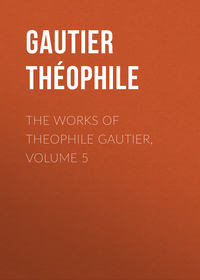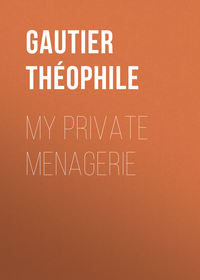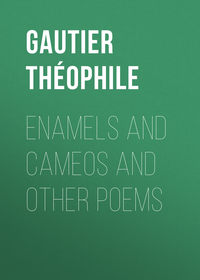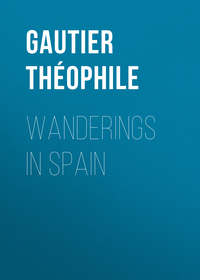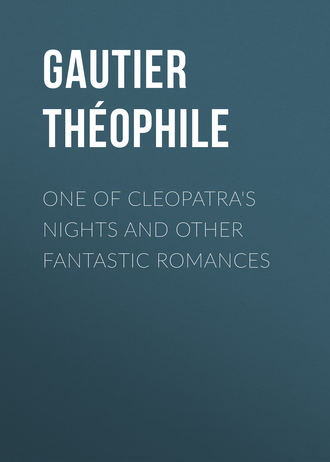 полная версия
полная версияOne of Cleopatra's Nights and Other Fantastic Romances
Then he gave an analysis of the comedy about to be performed by the actors, with that minuteness of detail which shows how little the element of surprise entered into the theatrical pleasures of the ancient. He told how the aged Stalino, being enamored of his beautiful slave Casina, desired to marry her to his farmer Olympio, a complaisant spouse whose place he himself would fill on the nuptial night; and how Lycostrata, wife of Stalino, in order to thwart the luxury of her vicious husband, sought to unite Casina in marriage to the groom Chalinus with the further idea of favoring the amours of her son – in fine, how the deceived Stalino mistook a young slave in disguise for Casina, who, being discovered to be free, and of free birth, espouses the young master whom she loves and by whom she is beloved.
As in a reverie, the young Frenchman watched the actors with their bronze-mouthed masks, exerting themselves upon the stage; the slaves ran hither and thither, feigning great haste; the old man wagged his head and extended his trembling hand; the matron with high words and scornful mien strutted in her importance and quarrelled with her husband, to the great delight of the audience. All these personages made their entrances and exits through three doors contrived in the foundation-wall and communicating with the green-room of the actors. The house of Stalino occupied one corner of the stage, and that of his old friend Alcesimus faced it on the opposite side. These decorations, although very well painted, represented the idea of a place rather than the place itself, like most of the vague scenery of the classic theatres.
When the nuptial procession, pompously escorting the false Casina, entered upon the stage, a mighty burst of laughter, such as Homer attributes to the gods, rang through all the amphitheatre, and thunders of applause evoked the vibrating echoes of the enclosure, but Octavian heard no more and saw no more of the play.
In the circle of seats occupied by the women, he had just beheld a creature of marvellous beauty. From that moment all the other charming faces which had attracted his attention became eclipsed as the stars before the face of Phœbus – all vanished, all disappeared as in a dream; a mist clouded the circles of seats with their swarming multitudes, and the high-pitched voices of the actors seemed lost in infinite distance.
His heart received a sudden shock as of electricity, and it seemed to him that sparks flew from his breast when the eyes of that woman turned upon him.
She was dark and pale. Her locks, crisp-flowing and black as the tresses of Night, streamed backward over her temples after the fashion of the Greeks, and in her pallid face beamed soft, melancholy eyes, heavy with an indefinable expression of voluptuous sadness and passionate ennui. Her mouth, with its disdainful curves, protested by the living warmth of its burning crimson against the tranquil pallor of her cheeks, and the curves of her neck presented those pure and beautiful outlines now to be found only in statues. Her arms were naked to the shoulder, and from the peaks of her splendid bosom, which betrayed its superb curves beneath a mauve-rose tunic, fell two graceful folds of drapery that seemed to have been sculptured in marble by Phidias or Cleomenes.
The sight of that bosom, so faultless in contour, so pure in its outlines, magnetically affected Octavian. It seemed to him that those rich curves corresponded perfectly to that hollow mould in the museum at Naples which had thrown him into so ardent a reverie, and from the depths of his heart a voice cried out to him that this woman was indeed the same who had been suffocated in the villa of Arrius Diomedes by the cinders of Vesuvius. What prodigy, then, enabled him to behold her living, and witnessing the performance of the Casina of Plautus? But he forbore to seek an explanation of the problem. For that matter, how did he himself happen to be there? He accepted the fact of his presence as in dreams we never question the intervention of persons actually long dead, but who seem to act nevertheless like living people; besides, his emotion forbade him to reason. For him the Wheel of Time had left its track, and his all-conquering love had chosen its place among the ages passed away. He found himself face to face with his chimera, one of the most unattainable of all, a retrospective chimera. The cup of his whole life had in a single instant been filled to overflowing.
While gazing upon that face, at once so calm and passionate, so cold and yet so replete with warmth, so dead, yet so radiant with life, he felt that he beheld before him his first and last love, his cup of supreme intoxication; he felt all the memories of all the women whom he ever believed that he had loved, vanish like impalpable shadows, and his heart became once more virginally pure of all anterior passion. The past was dead within him.
Meanwhile the fair Pompeiian, resting her chin upon the palm of her hand, turned upon Octavian, though feigning the while to be absorbed in the performance, the velvet gaze of her nocturnal eyes, and that look fell upon him heavy and burning as a jet of molten lead. Then she turned to whisper some words in the ear of a maid seated at her side.
The performance closed. The crowd poured out of the theatre through the vomitories, and Octavian, disdaining the kindly offices of his friend Holconius, rushed to the nearest door-way. He had scarcely reached the entrance when a hand was lightly laid upon his arm, and a feminine voice exclaimed in tones at once low yet so distinct that not a syllable escaped him:
"I am Tyche Novaleia, entrusted with the pleasures of Arria Marcella, daughter of Arrius Diomedes. My mistress loves you. Follow me."
Arria Marcella had just entered her litter, borne by four strong Syrian slaves, naked to the waist, whose bronze torsos shone under the sunlight. The curtain of the litter was drawn aside, and a pale hand, starred with brilliant rings, waved a friendly signal to Octavian, as though in confirmation of the attendant's words. Then the purple folds of the curtain fell again, and the litter was borne away to the rhythmical sound of the footsteps of the slaves.
Tyche conducted Octavian along winding byways, tripping lightly across the streets over the stepping-stones which connected the foot-paths, and between which the wheels of the chariots rolled, wending her way through the labyrinth with that certainty which bears witness to thorough familiarity with a city. Octavian noticed that he was traversing portions of Pompeii which had never been excavated, and which were in consequence totally unknown to him. Among so many other equally strange circumstances, this caused him no astonishment. He had made up his mind to be astonished at nothing. Amid all this archaic phantasmagory, which would have driven an antiquarian mad with joy, he no longer saw anything save the dark, deep eyes of Arria Marcella, and that superb bosom which had vanquished even Time, and which Destruction itself had sought to preserve.
They arrived at last before a private gate which opened to admit them, and closed again as soon as they had entered, and Octavian found himself in a court surrounded by Ionic columns of Greek marble, painted bright yellow for half their height and crowned with capitals relieved with blue and red ornaments. A wreath of aristolochia suspended its great green heart-shaped leaves from the projections of the architecture like a natural arabesque, and near a marble basin framed in plants one flaming rose towered on a single stalk – a plume-flower in the midst of natural flowers. The walls were adorned with panelled fresco-work, representing fanciful architecture or imaginary landscape views.
Octavian obtained only a hurried glance at all these details, for Tyche immediately placed him in the hands of the slaves who had charge of the bath, and who subjected him, notwithstanding his impatience, to all the refinements of the antique thermæ. After having submitted to the several necessary degrees of vapor-heat, endured the scraper of the strigillarius, and felt cosmetics and perfumed oils poured over him in streams, he was reclothed with a white tunic, and again met Tyche at the opposite door, who took him by the hand and conducted him into another apartment gorgeously decorated.
Upon the ceiling were painted, with a purity of design, brilliancy of color, and freedom of touch which bespoke the hand of a great master rather than of the mere ordinary decorator, Mars, Venus, and Love. A frieze composed of deer, hares, and birds, disporting themselves amid rich foliage, ran around the apartment above a wainscoting of cipollino marble; the mosaic pavement, a marvellous work from the hand, perhaps, of Sosimus of Pergamos, represented banquet-scenes in relief, with a perfection of art which deluded the eye.
At the further end of the hall, upon a biclinium, or double couch, reclined Arria Marcella in an attitude which recalled the reclining woman of Phidias, upon the pediment of the Parthenon. Her pearl-embroidered shoes lay at the foot of the couch, and her beautiful bare foot, purer and whiter than marble, extended from beneath the light covering of byssus which had been thrown over her.
Two earrings, fashioned in the form of balance-scales, and bearing pearls in either scale, trembled in the light against her pale cheeks. A necklace of golden balls, with pear-shaped pendants attached, hung down upon her bosom, which the negligent folds of a straw-colored peplum, with a Greek border in black lines, had left half uncovered; a gold and black fillet passed and glittered here and there through her ebon tresses, for she had changed her dress upon returning from the theatre, and around her arm, like the asp about the arm of Cleopatra, a golden serpent with jewelled eyes entwined itself in many folds and sought to bite its own tail.
Close by the double couch had been placed a little table, supported upon griffins' paws, inlaid with mother-of-pearl, and freighted with different viands served upon dishes of silver and gold, or of earthenware enamelled with costly paintings. A Phasian bird, cooked in its plumage, was visible, and also various fruits which are seldom seen together in any one season.
Everything seemed to indicate that a guest was expected. The floor had been strewn with fresh flowers, and the amphoræ of wine were plunged into urns filled with snow.
Arria Marcella made a sign to Octavian to lie down upon the biclinium beside her and share her repast. Half-maddened with astonishment and love, the young man took at random a few mouthfuls from the plates extended to him by little curly-haired Asiatic slaves, who wore short tunics. Arria did not eat, but she frequently raised to her lips an opal-tinted myrrhine vase filled with a wine darkly purple like thickened blood. As she drank an imperceptible rosy vapor mounted to her cheeks from her heart, the heart that had never throbbed for so many centuries; nevertheless, her bare arm, which Octavian lightly touched in the act of raising his cup, was cold as the skin of a serpent or the marble of a tomb.
"Ah, when you paused in the Studii Museum to contemplate the mass of hardened clay which still preserves my form," exclaimed Arria Marcella, turning her long, liquid eyes upon Octavian, "and your thoughts were ardently directed to me, my spirit felt it in that world where I float, invisible to vulgar eyes. Faith makes God, and love makes woman. One is truly dead only when one is no longer loved. Your desire has restored life to me. The mighty invocation of your heart overcame the dim distances that separated us."
The idea of amorous invocation which the young woman spoke of entered into the philosophic beliefs of Octavian, beliefs which we ourselves are not far from sharing.
In effect, nothing dies; all things are eternal. No power can annihilate that which once had being. Every action, every word, every thought which has fallen into the universal ocean of being, therein creates circles which travel, and increase in travelling, even to the confines of eternity. To vulgar eyes only do natural forms disappear, and the spectres which have thence detached themselves people Infinity. Paris, in some unknown region of space, continues to carry off Helen. The galley of Cleopatra still floats down with swelling sails of silk upon the azure current of an ideal Cydnus. A few passionate and powerful minds have been able to recall before them ages apparently long passed away, and to restore to life personages dead to all the world beside. Faust has had for his mistress the daughter of Tyndarus, and conducted her to his Gothic castle in the depths of the mysterious abysses of Hades. Octavian had been able to live a day under the reign of Titus, and to make himself beloved of Arria Marcella, daughter of Arrius Diomedes, she who was at that moment lying upon an antique couch beside him in a city destroyed for all the rest of the world.
"From my disgust with other women," replied Octavian, "from the unconquerable reverie which attracted me toward its radiant shapes as to stars that lure on, I knew that I could never love save beyond the confines of Time and Space. It was you that I awaited; and that frail vestige of your being, preserved by the curiosity of men, has by its secret magnetism placed me in communication with your spirit. I know not if you be a dream or a reality, a phantom or a woman; if, like Ixion, I press but a cloud to my cheated breast; if I am only the victim of some vile spell of sorcery – but what I do truly know is that you will be my first and my last love."
"May Eros, son of Aphrodite, hear your promise," returned Arria Marcella, dropping her head upon the shoulder of her lover, who lifted her in a passionate embrace. "Oh, press me to your young breast! Envelop me with your warm breath. I am cold through having remained so long without love." And against his heart Octavian felt that beautiful bosom rise and fall, whose mould he had that very morning admired through the glass of a cabinet in the museum. The coolness of that beautiful flesh penetrated him through his tunic and made him burn. The gold and black fillet had become detached from Arria's head, passionately thrown back, and her hair streamed like a black river over the purple pillow.
The slaves had removed the table. A confused sound of sighs and kisses was alone audible. The pet quails, indifferent to this amorous scene, plundered the crumbs of the banquet upon the mosaic pavement, uttering sharp little cries.
Suddenly the brazen rings of the curtain which closed the entrance to the apartment slided back upon the curtain-rod, and an aged man of stern demeanor and wrapped in a great brown mantle appeared upon the threshold. His gray beard was divided into two points after the manner of the Nazareans. His face seemed furrowed by the suffering of ascetic mortifications, and a little cross of black wood was suspended from his neck, leaving no doubt as to his faith. He belonged to the sect, then new, of the Disciples of Christ.
On perceiving him, Arria Marcella, overwhelmed with confusion, hid her face in the folds of her mantle, like a bird which puts its head under its wing at the approach of an enemy from whom it cannot escape, to save itself at least from the horror of seeing him, while Octavian, rising on his elbow, stared fixedly at the provoking being who had thus abruptly interrupted his happiness.
"Arria, Arria!" exclaimed the austere personage in a voice of reproach, "did not your lifetime suffice for your misconduct, and must your infamous amours encroach upon centuries to which they do not belong? Can you not leave the living in their sphere? Have not your ashes cooled since the day when you perished unrepentant beneath the rain of volcanic fire? So, then, even two thousand years have not sufficed to calm your passion, and your voracious arms still draw to your heartless breast of marble the poor mad-men whom your philters have intoxicated!"
"Arrius, father, mercy! Do not crush me in the name of that morose religion which was never mine! I believed in our ancient gods, who loved life and youth and beauty and pleasure. Do not hurl me back into pale nothingness! Let me enjoy this life that love has given back to me!"
"Silence, impious woman! Speak not to me of your gods, which are demons. Let this man, whom you have fettered with your impure seductions, depart hence. Draw him no more beyond the circle of that life which God measured out for him. Return to the Limbo of paganism with your Asiatic, Roman, or Greek lovers. Young Christian, forsake that larva, who would seem to you more hideous than Empousa or Phorkyas, could you but see her as she is!"
Pale and frozen with horror, Octavian tried to speak, but his voice clung to his throat, according to the expression of Virgil.
"Will you obey me, Arria?" imperiously cried the tall old man.
"No, never!" responded Arria, with flashing eyes, dilated nostrils, and passion-trembling lips, as she suddenly encircled the body of Octavian with her beautiful statuesque arms, cold, hard, and rigid as marble. Her furious beauty, enhanced by the struggle, shone forth at that supreme moment with supernatural brightness, as though to leave its imperishable souvenir with her young lover.
"Then, unhappy woman," exclaimed the old man, "I must needs employ extreme measures, and render your nothingness palpable and visible to this fascinated child." And in a voice of command he pronounced a formula of exorcism that banished from Arria's cheeks the purple tints with which the black wine from the myrrhine vase had suffused them.
At the same moment the distant bell of one of those hamlets which border the sea-coast, or lie hidden in the mountain hollows, rang out the first peal of the angelus.
A sob of agony burst from the broken heart of the young woman at that sound. Octavian felt her encircling arms untwine, the draperies which covered her sank fold on fold, as though the contours which sustained them had suddenly given way, and the wretched night-walker beheld on the banquet-couch beside him only a handful of cinders mingled with a few fragments of calcined bones, among which gold bracelets and jewelry glittered, together with such other shapeless remains as were found in excavating the villa of Arrius Diomedes.
He uttered one fearful cry and became insensible.
The old man had disappeared, the sun rose, and the hall, so brilliantly decorated but a short time before, became only a dismantled ruin.
After a heavy slumber, inspired by the libations of the previous evening, Max and Fabio started from their sleep, and at once called their comrade, whose room adjoined their own, with one of those burlesque rallying cries which are so commonly made use of by travellers. Octavian, for the best of reasons, returned no answer. Fabio and Max, hearing no response, entered their friend's chamber and perceived that the bed had not been disturbed.
"He must have fallen asleep in some chair," said Fabio, "without being able to get to bed, for our good Octavian cannot bear much liquor; and most likely he is taking an early walk to dissipate the fumes of the wine in the fresh morning air."
"But he did not drink much," returned Max, in a thoughtful manner. "All this seems very strange to me. Let us go and find him!"
Accompanied by the cicerone, the two friends searched all the streets, squares, cross-roads, and alleys of Pompeii, entering every curious building where they thought Octavian might be occupied in copying a painting or taking down an inscription, and finally discovered him lying insensible upon the disjointed mosaic pavement of a small ruined chamber. They had much difficulty in restoring him to consciousness, and on reviving, his only explanation of the circumstance was that he had taken a fancy to see Pompeii by moonlight, and had been seized with a sudden faintness, which would doubtless result in nothing serious.
The little party returned by rail to Naples, as they had come, and the same evening, from their private box at the San Carlo, Max and Fabio watched through their opera glasses a troupe of nymphs dancing in a ballet, under the leadership of Amalia Ferraris, the danseuse then in vogue, all wearing under their gauzy skirts frightful green drawers, which made them look like so many frogs stung by a tarantula. Pale, with woful eyes, and the general air of one crushed by suffering, Octavian seemed to doubt the reality of what transpired upon the stage, so difficult did he find it to resume the sentiments of real life after the marvellous adventures of the night.
From the time of that visit to Pompeii Octavian fell into a dismal melancholy, which the good-humored pleasantry of his companions rather aggravated than soothed. The image of Arria Marcella haunted him incessantly, and the sad termination of his fantastic good fortune had never destroyed its charm.
Unable to contain his misery, he returned secretly to Pompeii, and once again wandered among the ruins by moonlight as before, his heart palpitating with maddening hope; but the hallucination never returned. He saw only the lizards fleeing over the stones, he heard only the screams of the startled night-birds. He met his friend Rufus Holconius no more, Tyche came not to lay her supple hand upon his arm, Arria Marcella obstinately slumbered in her dust.
Abandoning all hope, Octavian finally married a charming young English girl, who is madly in love with him. He is perfectly well behaved to his wife, yet Ellen, with that subtle instinct of the heart which nothing can deceive, feels that her husband is enamored of another. But of whom? That is a mystery which the most unflagging watchfulness cannot enable her to unravel. Octavian never entertains actresses. In society he addresses to women only the most commonplace gallantries. He even returned with the greatest coldness the marked advances of a certain Russian princess celebrated for her beauty and her coquetry. A secret drawer, opened during her husband's absence, afforded no confirmation of infidelity to Ellen's suspicions. But how could she permit herself to be jealous of Arria Marcella, daughter of Arrius Diomedes, the freedman of Tiberius?
THE MUMMY'S FOOT
I had entered, in an idle mood, the shop of one of those curiosity venders who are called marchands de bric-à-brac in that Parisian argot which is so perfectly unintelligible elsewhere in France.
You have doubtless glanced occasionally through the windows of some of these shops, which have become so numerous now that it is fashionable to buy antiquated furniture, and that every petty stockbroker thinks he must have his chambre au moyen âge.
There is one thing there which clings alike to the shop of the dealer in old iron, the ware-room of the tapestry maker, the laboratory of the chemist, and the studio of the painter: in all those gloomy dens where a furtive daylight filters in through the window-shutters the most manifestly ancient thing is dust. The cobwebs are more authentic than the guimp laces, and the old pear-tree furniture on exhibition is actually younger than the mahogany which arrived but yesterday from America.
The warehouse of my bric-à-brac dealer was a veritable Capharnaum. All ages and all nations seemed to have made their rendezvous there. An Etruscan lamp of red clay stood upon a Boule cabinet, with ebony panels, brightly striped by lines of inlaid brass; a duchess of the court of Louis XV. nonchalantly extended her fawn-like feet under a massive table of the time of Louis XIII., with heavy spiral supports of oak, and carven designs of chimeras and foliage intermingled.
Upon the denticulated shelves of several sideboards glittered immense Japanese dishes with red and blue designs relieved by gilded hatching, side by side with enamelled works by Bernard Palissy, representing serpents, frogs, and lizards in relief.
From disembowelled cabinets escaped cascades of silver-lustrous Chinese silks and waves of tinsel, which an oblique sunbeam shot through with luminous beads, while portraits of every era, in frames more or less tarnished, smiled through their yellow varnish.
The striped breastplate of a damascened suit of Milanese armor glittered in one corner; loves and nymphs of porcelain, Chinese grotesques, vases of céladon and crackle-ware, Saxon and old Sèvres cups encumbered the shelves and nooks of the apartment.


